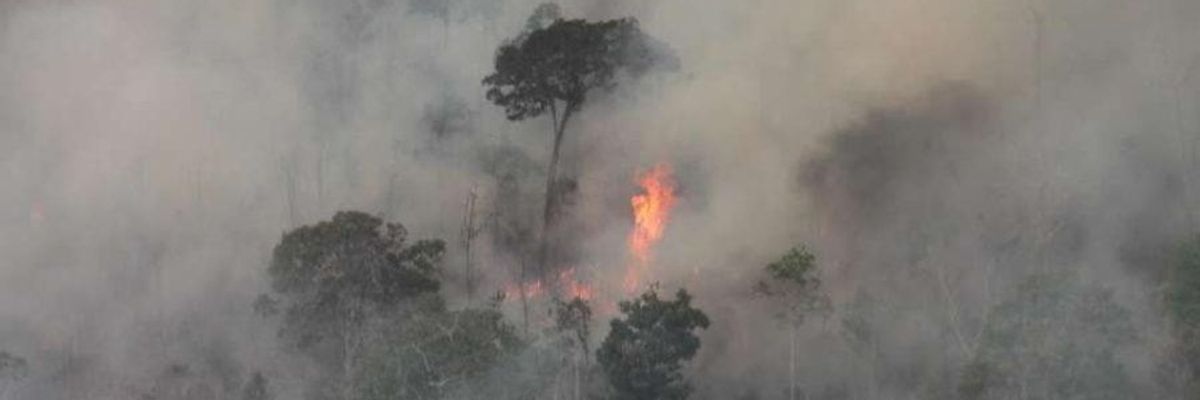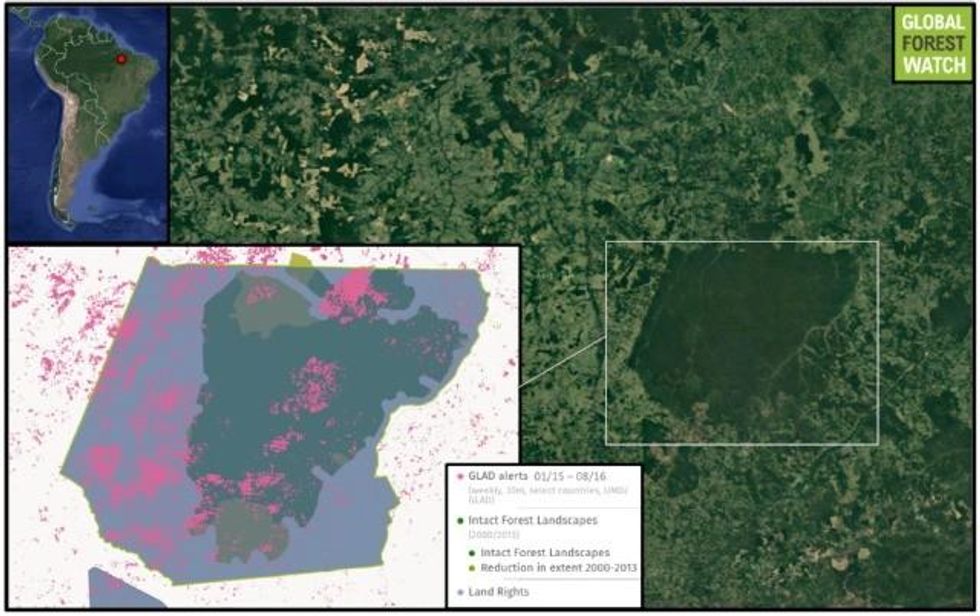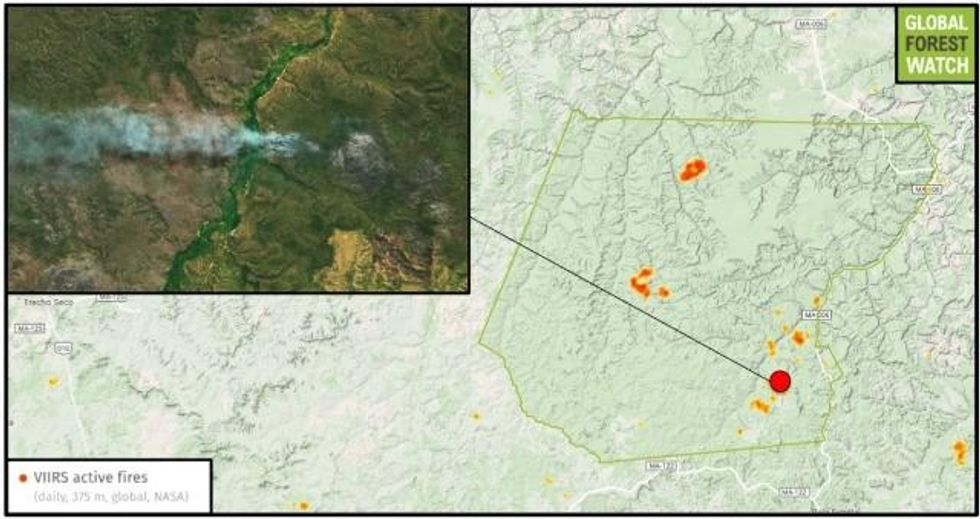
Fires are destroying pre-Amazon forest and threatening to wipe out uncontacted Indians for the second time in less than a year. (INPE)
To donate by check, phone, or other method, see our More Ways to Give page.

Fires are destroying pre-Amazon forest and threatening to wipe out uncontacted Indians for the second time in less than a year. (INPE)
In April 2012, Survival International launched a global campaign to save the Awa, an uncontacted indigenous people that has been called "Earth's most threatened tribe." Two years later, the campaign claimed victory when the Brazilian government sent troops to remove illegal cattle ranchers and loggers from Awa land.
But now the Awa are facing yet another existential threat in the form of forest fires. According to Survival International, fires are "raging" in Awa territory on the edge of the Brazilian Amazon and "threatening to wipe out uncontacted members of the Awa tribe."
Small groups of Guajajara Indians, the Awa's neighbors in the Amazon, reportedly battled the blaze for days without the assistance of government agents until Brazil's Environment Ministry launched a fire-fighting operation two weeks ago.
According to Survival International, nearly 50 percent of the forest cover in the territory was destroyed by forest fires started by loggers in late 2015, and the Environment Ministry has warned that the situation is "even worse this year."


"This is an urgent and horrific humanitarian crisis," Survival International Director Stephen Corry said in a post on the group's site. "The Brazilian authorities know that fires are going to break out in the dry season, and that they could decimate uncontacted peoples. Brazil needs to take its eyes off the Olympics and focus proper attention on stopping the annihilation of its tribal peoples."
Survival International alleges illegal loggers have destroyed more than 30 percent of the forest in Awa territory. Still, the land still contains some of the eastern Amazon's last remaining patches of rainforest.

Members of a group called the Guajajara Guardians have not only been fighting the fires encroaching on their territory, they also patrol the forest in the hopes of evicting illegal loggers and protecting their uncontacted neighbors. The Guajajara Guardians receive little support from the Brazilian government, however, and they say that as long as they don't have the resources they need to conduct their expeditions, the territory will remain vulnerable.
"We are defending our territory, so that the uncontacted Awa can survive," said Olimpio Guajajara, the leader of the group, according to Survival International. "We have managed to reduce the number of loggers on our land and we hope to force all of them out. Otherwise, the Awa could be wiped out. We just want them to be able to live in peace."
Common Dreams is powered by optimists who believe in the power of informed and engaged citizens to ignite and enact change to make the world a better place. We're hundreds of thousands strong, but every single supporter makes the difference. Your contribution supports this bold media model—free, independent, and dedicated to reporting the facts every day. Stand with us in the fight for economic equality, social justice, human rights, and a more sustainable future. As a people-powered nonprofit news outlet, we cover the issues the corporate media never will. Join with us today! |
In April 2012, Survival International launched a global campaign to save the Awa, an uncontacted indigenous people that has been called "Earth's most threatened tribe." Two years later, the campaign claimed victory when the Brazilian government sent troops to remove illegal cattle ranchers and loggers from Awa land.
But now the Awa are facing yet another existential threat in the form of forest fires. According to Survival International, fires are "raging" in Awa territory on the edge of the Brazilian Amazon and "threatening to wipe out uncontacted members of the Awa tribe."
Small groups of Guajajara Indians, the Awa's neighbors in the Amazon, reportedly battled the blaze for days without the assistance of government agents until Brazil's Environment Ministry launched a fire-fighting operation two weeks ago.
According to Survival International, nearly 50 percent of the forest cover in the territory was destroyed by forest fires started by loggers in late 2015, and the Environment Ministry has warned that the situation is "even worse this year."


"This is an urgent and horrific humanitarian crisis," Survival International Director Stephen Corry said in a post on the group's site. "The Brazilian authorities know that fires are going to break out in the dry season, and that they could decimate uncontacted peoples. Brazil needs to take its eyes off the Olympics and focus proper attention on stopping the annihilation of its tribal peoples."
Survival International alleges illegal loggers have destroyed more than 30 percent of the forest in Awa territory. Still, the land still contains some of the eastern Amazon's last remaining patches of rainforest.

Members of a group called the Guajajara Guardians have not only been fighting the fires encroaching on their territory, they also patrol the forest in the hopes of evicting illegal loggers and protecting their uncontacted neighbors. The Guajajara Guardians receive little support from the Brazilian government, however, and they say that as long as they don't have the resources they need to conduct their expeditions, the territory will remain vulnerable.
"We are defending our territory, so that the uncontacted Awa can survive," said Olimpio Guajajara, the leader of the group, according to Survival International. "We have managed to reduce the number of loggers on our land and we hope to force all of them out. Otherwise, the Awa could be wiped out. We just want them to be able to live in peace."
In April 2012, Survival International launched a global campaign to save the Awa, an uncontacted indigenous people that has been called "Earth's most threatened tribe." Two years later, the campaign claimed victory when the Brazilian government sent troops to remove illegal cattle ranchers and loggers from Awa land.
But now the Awa are facing yet another existential threat in the form of forest fires. According to Survival International, fires are "raging" in Awa territory on the edge of the Brazilian Amazon and "threatening to wipe out uncontacted members of the Awa tribe."
Small groups of Guajajara Indians, the Awa's neighbors in the Amazon, reportedly battled the blaze for days without the assistance of government agents until Brazil's Environment Ministry launched a fire-fighting operation two weeks ago.
According to Survival International, nearly 50 percent of the forest cover in the territory was destroyed by forest fires started by loggers in late 2015, and the Environment Ministry has warned that the situation is "even worse this year."


"This is an urgent and horrific humanitarian crisis," Survival International Director Stephen Corry said in a post on the group's site. "The Brazilian authorities know that fires are going to break out in the dry season, and that they could decimate uncontacted peoples. Brazil needs to take its eyes off the Olympics and focus proper attention on stopping the annihilation of its tribal peoples."
Survival International alleges illegal loggers have destroyed more than 30 percent of the forest in Awa territory. Still, the land still contains some of the eastern Amazon's last remaining patches of rainforest.

Members of a group called the Guajajara Guardians have not only been fighting the fires encroaching on their territory, they also patrol the forest in the hopes of evicting illegal loggers and protecting their uncontacted neighbors. The Guajajara Guardians receive little support from the Brazilian government, however, and they say that as long as they don't have the resources they need to conduct their expeditions, the territory will remain vulnerable.
"We are defending our territory, so that the uncontacted Awa can survive," said Olimpio Guajajara, the leader of the group, according to Survival International. "We have managed to reduce the number of loggers on our land and we hope to force all of them out. Otherwise, the Awa could be wiped out. We just want them to be able to live in peace."